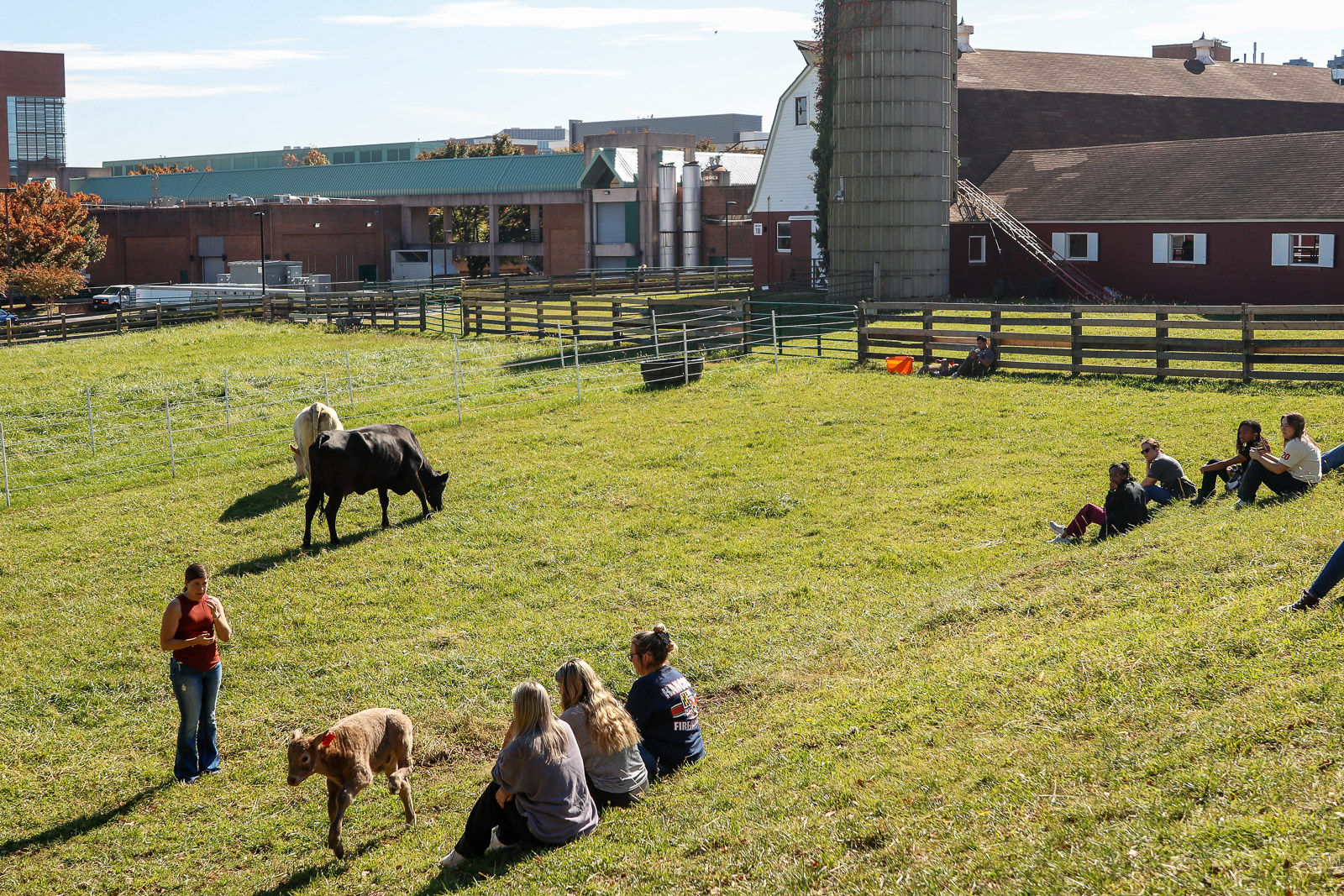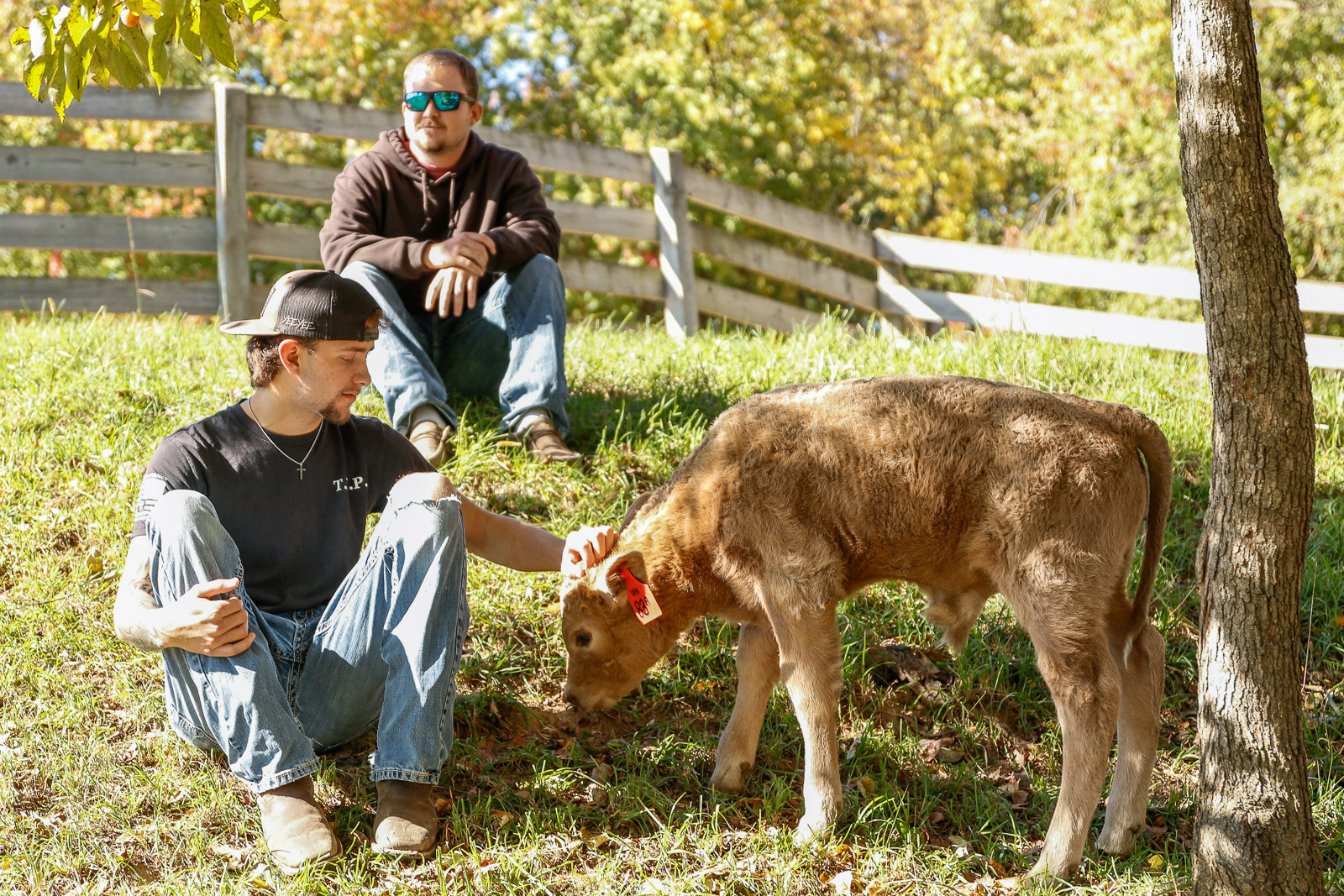Multiyear efforts by many result in a growing herd and class offerings
Students in the inaugural ANSC 246 class observe calves born on the Campus Farm while they pasture.
Image Credit: Jonathan Stephanoff
For Racheal Slattery and others, Fall 2023 saw the culmination of a multiyear effort resulting in four spunky bull calves born on the Campus Farm in October. ANSC 246 Beef Management is a new ANSC class developed by Slattery and made possible by her work with Brian Spielman, Assistant Director of the Clarksville facility and his crew, and four bred heifers that are part of ANSC’s beef teaching herd made up of Charolais and Wye Angus Cross.
The heifers were brought to the Campus Farm in early October and ANSC 246 students were responsible for observing and helping the cattle through calving, and the calves' early care. The course was designed to give students hands-on experience with beef cattle and enable them to work with beef herds throughout the region, especially during spring calving.
“I'm truly proud of my students and how we all have worked through this first ever offering of ANSC 246 Beef Management,” Slattery said, adding, “A majority of my students are not from a farming background, and those that [are] weren't necessarily from beef farms.”
Gerald Roper and Bella Sterba were two students in the inaugural ANSC 246 class. Roper decided to take 246 because “it sounded interesting getting to observe calving on campus, and since I'm also part of the student farm crew I was excited to see it.” Sterba took the class “because of my interest in cattle in general and I wanted to learn more about the beef industry and how it operates.”


Thinking back on the class, Sterba shared, “A memorable experience I had this semester was when we had class outside in the pasture with the cattle roaming learning about behavior. The week had been particularly rough for everyone and Racheal decided to take advantage of the nice weather and let us spend some time bonding with the cows since there wasn't a lot of opportunity to do so other than during the night watches.” Roper also noted memorable times in pasture with the heifers and calves, as well as experiential learning field trips to beef and cattle locations around the state including the Wye, CMREC, and Roseda.
While not on the Campus Farm, the herd pastures at the Beef Management Teaching and Demonstration Site, which has nearly 30 acres and straddles a stream bed running through agricultural fields at the Central Maryland Research and Education Center (CMREC), near Ellicott City.
The beginnings of this class and the herd go back to early 2022. In June of that year, Slattery proudly received the gift of three Charolais heifers from Robert and Judy Tibbs of Shadow Springs Farm. Before the calves were born this fall, the Charolais and three Wye Angus/Holstein cross-breed heifers made up the foundation of the teaching herd.
All the calves born this fall were named after characters on CBS’s NCIS show, including Leroy, Jethro, Tony, Ducky, and Jenny. With the addition of the four bull calves born on campus and one heifer calf born at CMREC, the herd now totals 11. The bull calves will be raised with the herd and brought back to the Campus Farm for ANSC 103 next fall. Jenny will remain with the herd and eventually be bred for ANSC 246 in the Fall of 2026.
“We are finishing up the class learning about meat science and meat quality,” Slattery said at the end of the semester. The class has also covered disease prevention through animal behavior and management, facility designs using animal behavior, breeding and selection, and marketing.
Roper had a suggestion to classmates considering ANSC 246 next fall, “Sign up quick, it fills up fast. It's a really fun class, you'll learn a lot about beef cattle, and Racheal herself is a really good teacher.” Sterba added, “the things we learned in class were very interesting and able to be used to educate general people about the basics of beef cattle and the industry.”